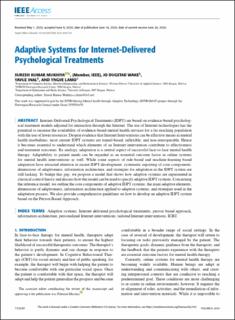Adaptive Systems for Internet-Delivered Psychological Treatments
Journal article, Peer reviewed
Published version

Åpne
Permanent lenke
https://hdl.handle.net/11250/2732362Utgivelsesdato
2020Metadata
Vis full innførselSamlinger
Sammendrag
Internet-Delivered Psychological Treatments (IDPT) are based on evidence-based psychological treatment models adjusted for interaction through the Internet. The use of Internet technologies has the potential to increase the availability of evidence-based mental health services for a far-reaching population with the use of fewer resources. Despite evidence that Internet Interventions can be effective means in mental health morbidities, most current IDPT systems are tunnel-based, inflexible, and non-interoperable. Hence it becomes essential to understand which elements of an Internet intervention contribute to effectiveness and treatment outcomes. By analogy, adaptation is a central aspect of successful face-to-face mental health therapy. Adaptability to patient needs can be regarded as an essential outcome factor in online systems for mental health interventions as well. While some aspects of rule-based and machine-learning-based adaptation have attracted attention in recent IDPT development, systematic reporting of core components, dimensions of adaptiveness, information architecture, and strategies for adaptation in the IDPT system are still lacking. To bridge this gap, we propose a model that shows how adaptive systems are represented in classical control theory and discuss how the model can be used to specify adaptive IDPT systems. Concerning the reference model, we outline the core components of adaptive IDPT systems, the main adaptive elements, dimensions of adaptiveness, information architecture applied to adaptive systems, and strategies used in the adaptation process. We also provide comprehensive guidelines on how to develop an adaptive IDPT system based on the Person-Based Approach.
